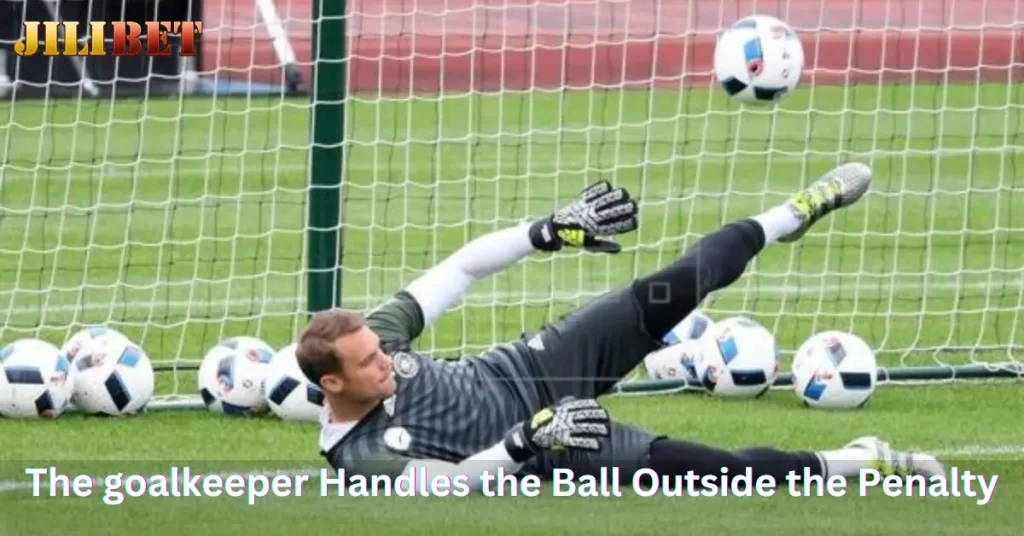Overview The goalkeeper Handles the Ball Outside the Penalty
The goalkeeper handles the ball outside the penalty area is probably the rarest situation that features the goalkeepers in a football match. It does seem very unlikely that a goalkeeper rushes outside his penalty area to handle the ball with their hands deliberately; however, such situations could present themselves when players are under stress and in desperate situations.
Today, let’s discuss with NicePH what goes on in the event that the keeper handles the ball out of the penalty area!
The Role of the Goalkeeper in Football
In football, the goalkeeper is the last line of defense, positioned behind their team’s backline. Their primary role is to guard the goal and prevent the opposing team from scoring.
The goalkeeper is the only player allowed to use their hands and arms to touch the ball during play, but this privilege is strictly limited to the penalty area of their own team.
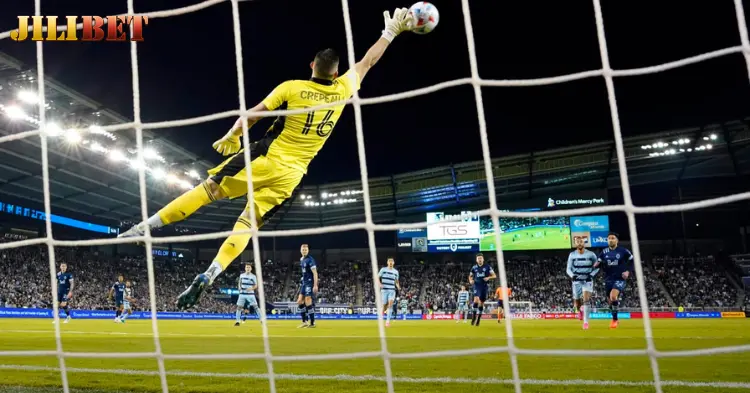
Every team must have one goalkeeper on the field during a match. If the goalkeeper is forced to leave the field due to an injury or a red card, another player must take their place in goal.
If a team runs out of substitutes or has no other available goalkeepers, an outfield player may step in as goalkeeper. Goalkeepers are required to wear a different-colored jersey to distinguish themselves from their teammates, opponents, referees, and the opposing goalkeeper.
This position is seen in various forms of football, including futsal, beach soccer, 5-a-side, 7-a-side, 9-a-side, and the traditional 11-a-side format.
=> Read more: Football Betting Tips to Boost Winning Odds on Betting Platforms
The Goalkeeper Handles The Ball Outside The Penalty Area
The goalkeeper’s role is unique on the field, as they are allowed to use their hands within the penalty area. However, handling the ball outside this area is considered a handball offense and is a violation of football rules, immediately resulting in the referee blowing the whistle.
Goalkeepers are typically well-versed in the rules and regulations regarding handling the ball outside the penalty area and are unlikely to commit such an offense intentionally. However, during a match, they may inadvertently or absentmindedly touch the ball with their hands outside the penalty area.
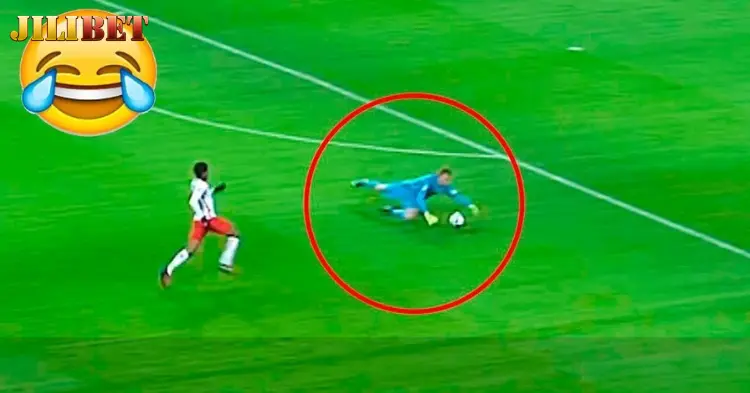
Whether the action is deemed accidental or deliberate depends on the referee’s judgment and impartiality. Unfortunately, there have been instances of biased calls in certain matches. Nonetheless, any instance of a goalkeeper handling the ball outside the penalty area will undoubtedly result in a free kick being awarded to the opposing team. Whether the goalkeeper receives a card (yellow or red) depends on whether the action is judged as intentional or unintentional.
Tips and Skills for Goalkeepers
Ball-Handling Techniques
To become a great goalkeeper, mastering the art of ball-handling is essential. A skilled goalkeeper needs precision in catching the ball and sharp judgment to provide a solid foundation for their teammates. Ball-handling techniques are generally divided into two categories: low ball-handling and high ball-handling.
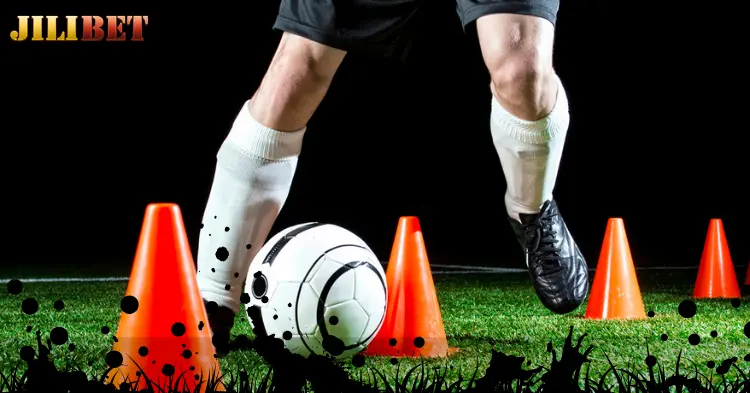
Low Ball-Handling
This technique includes two variations: standing low-ball catching and kneeling low-ball catching.
- For standing low-ball catching, the goalkeeper should stand with their feet parallel, toes pointing forward, and their body leaning slightly forward. The knees should be slightly bent to reduce pressure.
- For kneeling low-ball catching, the goalkeeper kneels on one leg, keeping the legs tightly closed to prevent the ball from slipping through. The hands should form a straight line to bring the ball securely into the chest, making it easier to hold the ball tightly.
High Ball-Handling:
This technique requires precise judgment and calculation. It’s relatively simple but demands accuracy. When the ball is approaching, the goalkeeper should jump off one foot, extend both hands towards the ball with palms facing forward, and form a pocket shape with their fingers to catch the ball securely.
=> Read more: Corner Betting – Everything You Need to Know at NicePH
Communication, Coordination, and Defensive Skills
Beyond ball-handling, a good goalkeeper must have excellent observation skills and the ability to communicate effectively with teammates. This is crucial for organizing the defensive line, as the goalkeeper has the best view of the entire field.
A goalkeeper who can alert teammates to positional errors or missed marks on opposing forwards can promptly direct adjustments, earning the trust of the defensive line. This makes them a highly reliable presence in goal.
Training Focus and Mental Fortitude
A top-level goalkeeper must always maintain focus, stay alert, and possess a strong mindset to prepare for the worst-case scenarios. Regardless of the situation, goalkeepers must remain vigilant and ready to dive into action to protect the goal, especially when their team loses possession.
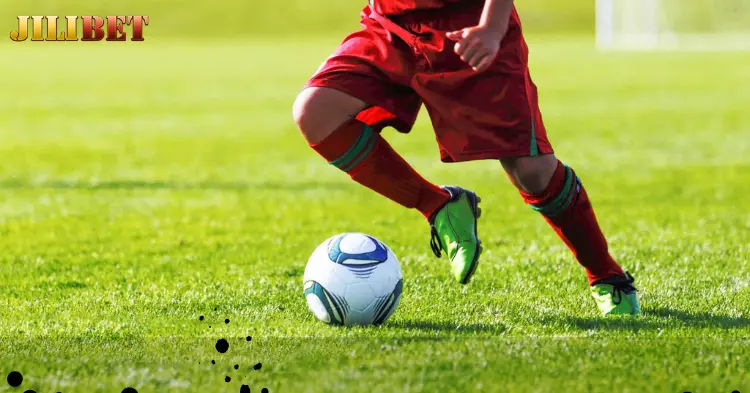
Developing the ability to stay intensely focused is one of the key elements of becoming an exceptional goalkeeper. Without the ability to manage on-field situations and make quick judgments, a goalkeeper may struggle to cover for teammates or prevent the opponent from scoring.
=> Read more: What is Match Fixing? Signs of Match-Fixing Behavior
Building Courage
Courage is a non-negotiable quality for any goalkeeper. They must be fearless when facing any situation, even when under direct threat. If you are afraid of the ball or instinctively turn away when an opponent takes a shot, then goalkeeping may not be the right position for you.
By combining bravery with sharp situational judgment, you can become a dependable goalkeeper, offering steadfast support to your team.
Jumping and Diving Skills
To excel as a goalkeeper, mastering diving and aerial ball-catching is crucial, especially for intercepting high-flying shots. When diving, the goalkeeper should lower their center of gravity, lean towards the ball’s direction, and use the foot closest to the ball to push forcefully off the ground. This motion propels the body into the air to intercept the ball.
In addition to diving for the ball, goalkeepers often need to dive to snatch the ball from an opponent’s feet during one-on-one situations near the goal.
=> Are you looking for a reputable and top-quality casino for betting? Try our partners: SuperPH.
Conclusion about the Goalkeeper Handles the Ball Outside the Penalty
While goalkeepers enjoy certain privileges in football, such as using their hands within the penalty area, they are still subject to the same rules as other players on the field. Mastering techniques, maintaining focus, and demonstrating courage are essential steps in becoming a skilled and reliable goalkeeper.

